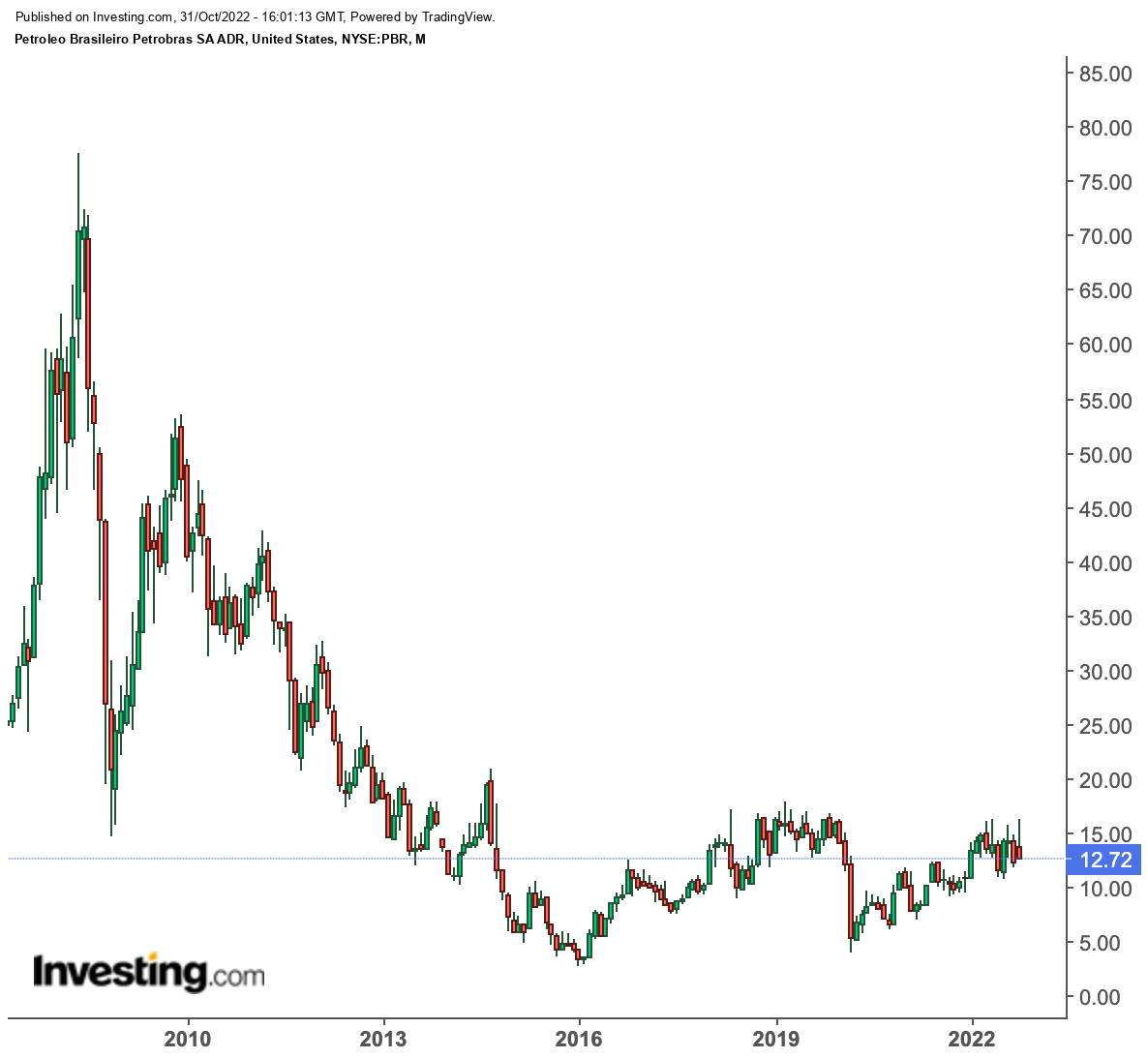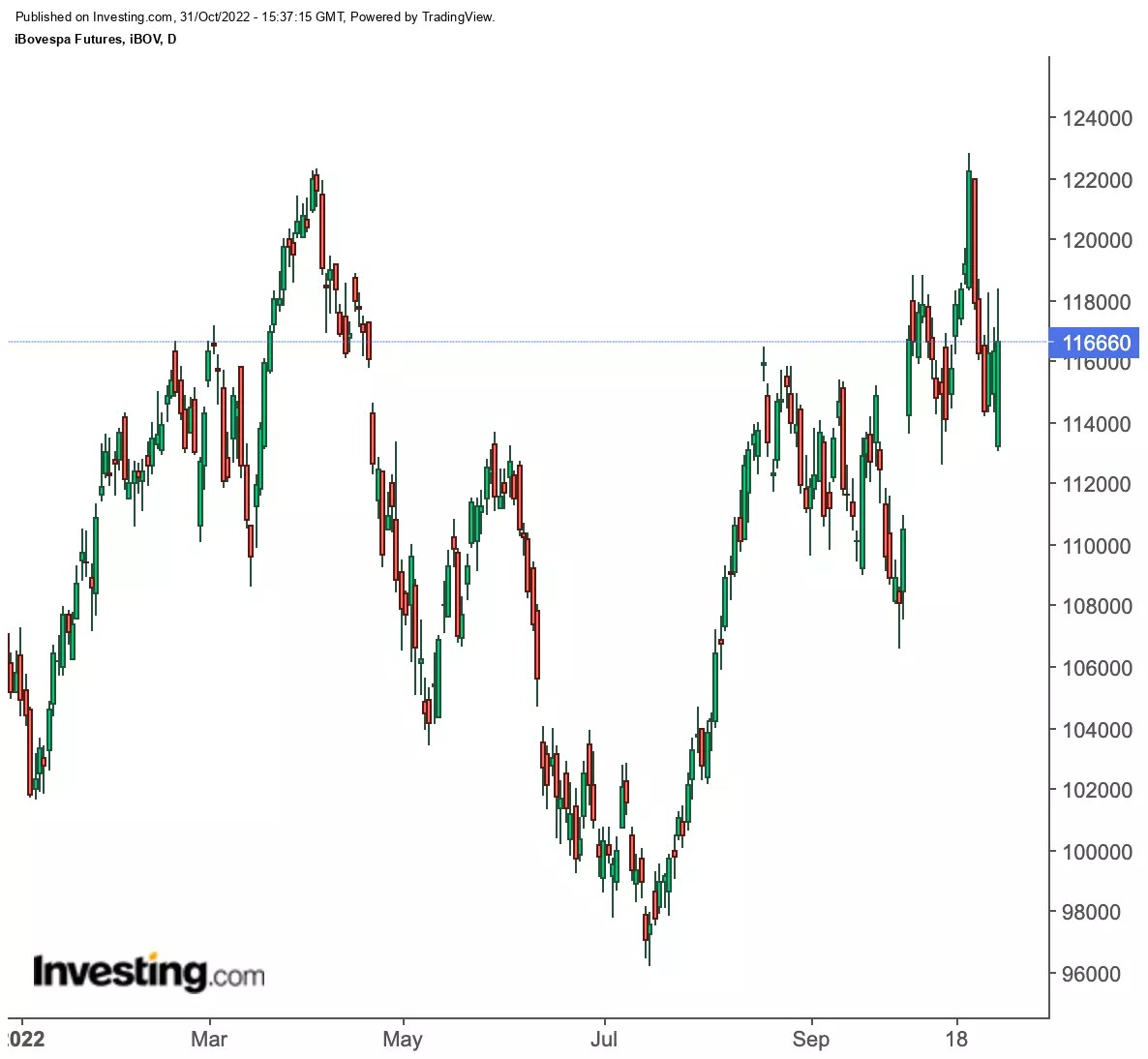USD/BRL
+0.02%
Add to/Remove from Watchlist
Add to Watchlist
Add Position
Position added successfully to:
Please name your holdings portfolio
Type:
BUY
SELL
Date:
Amount:
Price
Point Value:
Leverage:
1:1
1:10
1:25
1:50
1:100
1:200
1:400
1:500
1:1000
Commission:
Create New Watchlist
Create
Create a new holdings portfolio
Add
Create
+ Add another position
Close
PBR
-4.68%
Add to/Remove from Watchlist
Add to Watchlist
Add Position
Position added successfully to:
Please name your holdings portfolio
Type:
BUY
SELL
Date:
Amount:
Price
Point Value:
Leverage:
1:1
1:10
1:25
1:50
1:100
1:200
1:400
1:500
1:1000
Commission:
Create New Watchlist
Create
Create a new holdings portfolio
Add
Create
+ Add another position
Close
KC
+4.49%
Add to/Remove from Watchlist
Add to Watchlist
Add Position
Position added successfully to:
Please name your holdings portfolio
Type:
BUY
SELL
Date:
Amount:
Price
Point Value:
Leverage:
1:1
1:10
1:25
1:50
1:100
1:200
1:400
1:500
1:1000
Commission:
Create New Watchlist
Create
Create a new holdings portfolio
Add
Create
+ Add another position
Close
ZS
+0.12%
Add to/Remove from Watchlist
Add to Watchlist
Add Position
Position added successfully to:
Please name your holdings portfolio
Type:
BUY
SELL
Date:
Amount:
Price
Point Value:
Leverage:
1:1
1:10
1:25
1:50
1:100
1:200
1:400
1:500
1:1000
Commission:
Create New Watchlist
Create
Create a new holdings portfolio
Add
Create
+ Add another position
Close
iBOV
+0.36%
Add to/Remove from Watchlist
Add to Watchlist
Add Position
Position added successfully to:
Please name your holdings portfolio
Type:
BUY
SELL
Date:
Amount:
Price
Point Value:
Leverage:
1:1
1:10
1:25
1:50
1:100
1:200
1:400
1:500
1:1000
Commission:
Create New Watchlist
Create
Create a new holdings portfolio
Add
Create
+ Add another position
Close
FC
-0.58%
Add to/Remove from Watchlist
Add to Watchlist
Add Position
Position added successfully to:
Please name your holdings portfolio
Type:
BUY
SELL
Date:
Amount:
Price
Point Value:
Leverage:
1:1
1:10
1:25
1:50
1:100
1:200
1:400
1:500
1:1000
Commission:
Create New Watchlist
Create
Create a new holdings portfolio
Add
Create
+ Add another position
Close
LIPR3
+0.00%
Add to/Remove from Watchlist
Add to Watchlist
Add Position
Position added successfully to:
Please name your holdings portfolio
Type:
BUY
SELL
Date:
Amount:
Price
Point Value:
Leverage:
1:1
1:10
1:25
1:50
1:100
1:200
1:400
1:500
1:1000
Commission:
Create New Watchlist
Create
Create a new holdings portfolio
Add
Create
+ Add another position
Close
The return of left-wing Lula to Brazil’s highest post completes a regional political pivot started in Mexico in 2018
Lula said his country, the world’s third-largest food exporter is “not interested in the role of an eternal commodity exporter”
However, Brazil has undertaken a growing role in supplying the world’s food in the face of the war in Ukraine—and has largely benefited
In Brazil’s tightest run-off election ever, former left-wing president Luiz Inacio Lula da Silva returned to power after 13 years after securing 50.8% of the country’s valid votes yesterday. It will be his third, non-consecutive mandate after 13 years out of office. Jair Bolsonaro is Brazil’s first democratically elected president not to win a second term and is yet to concede defeat publicly.
In his victory speech last night at a hotel in the country’s largest city, Sao Paulo, the 77-year-old Lula talked about reuniting a highly divided country, saying that “there’s only one Brazil,” a feat that appears unlikely given that Lula will face fierce opposition in the congress, senate and states.
Brazil’s political pivot is the latest and most significant in Latin America in the last few years. It completes a broad regional shift to left-wing nationalism that has overtaken Latin America by storm since Andrés Manuel López Obrador first took office as the president of Mexico in late 2018.
While it remains early to assess the full implications of Lula’s election, here are a few immediate takeaways relevant to the global economy.
Food Commodities
Brazil is currently the third-largest food producer in the world. It recently displaced the U.S. as the world’s leading beef exporter and remains the greatest exporter of coffee and soybeans.
With tight global grain supplies due to the war in Ukraine, record drought in Europe and unusual rains in India and China, the South American country has emerged as one of the world’s leading short-term solutions to the growing food-security problem.
However, in his speech last night, Lula said Brazil is “not interested in the role of an eternal commodity exporter.” In turn, he vowed to prioritize small and medium rural producers, given that they provide the bulk of his country’s internal food supplies.
The statement indicates a pivot from Bolsonaro’s export-focused agricultural policy, which led to two years of record commodity exports for the country on the back of rising global prices.
A change in Brazilian agricultural policy would likely be a headwind to the world’s food supplies, possibly resulting in higher market and consumer prices.
Unlike the U.S., Europe and China—which have already reached peak farmland—Brazil has been growing its arable area exponentially during Bolsonaro’s government. This, in turn, led to environmental concerns, especially regarding the deforestation of the Amazon region.
As the president and CEO of Chicago-based AgResource, Dan Basse, said in an interview: “We estimate that the world needs to bring another 25 million acres of cropland in the next five years to balance things out. Most of that land will have to come from South America.”
Petrobras
While Lula did not mention anything specific about state-run corporate giants, like Petroleo Brasileiro Petrobras (NYSE:PBR) or Eletrobras (BVMF:LIPR3), the country’s oil and electricity businesses, his political trajectory indicates the government will likely pursue a greater decision power in these companies.
During his former government, the president controlled the country’s inflation through price-cap policies in both companies, overextending their balance sheets and leading to mediocre stock gains in the long run.
Furthermore, a major corruption scandal that engulfed the governments of both Lula and his successor, Dilma Rousseff, helped drag Petrobras to new lows.
That panorama began to change during Michel Temer’s presidency in 2016, when the former president stated the company was to sell its immense crude oil production at prices on par with the U.S. WTI benchmark.
The liberalization of the company deepened with Bolsonaro, marked by a significant decrease in governmental ownership of ordinary stocks and the sale of many oil-exploration licenses to private foreign and Brazilian-based companies.
During that period, the company improved its operating margins and raised cash reserves, which led to a gain of roughly 130% for the stock. Petrobras also ballooned its dividend yield to nearly 35%.
 Petrobras Long-Term Chart
Petrobras Long-Term Chart
However, on the downside, Brazilian electors bore the brunt of exponential hikes in gas prices in 2021 as the country’s currency devaluated against the U.S. dollar and the commodity rose in global trading.
Also, during Bolsonaro’s mandate, the Brazilian government maintained absolute voting control over the company, often interfering in the company’s presidency and board of directors. (Read more about Petrobras here).
Petrobras is down nearly 4% as of the time of writing.
Currency And Stock Market
The Brazilian real has been one of the few currencies in the world to have gained ground against the U.S. dollar this year, up roughly 5%. The main reason is the assumption that the country’s central bank is further ahead of the Fed in its monetary tightening cycle.
Base interest rates in the country have been running at 13.75%, and inflation has, in fact, subsided over the previous three months. Unemployment has also been trending down, and GDP estimates revised upward, a sign that the overall economy remains resilient in the face of the current global crisis.
Brazil is also less affected by the Russian invasion of Ukraine due to its energetic reliance on renewable sources, mainly hydropower. Natural gas comprises less than 10% of the country’s energy matrix.
Those factors have made Brazil’s stock market one of the year’s leading global performers, with the benchmark iBovespa up 10% YTD. The benchmark has also been harvesting the fruits of high commodity prices due to its heavy exposure to agricultural and oil companies.
 iBovespa Futures Daily Chart
iBovespa Futures Daily Chart
During his first term, president Lula bet his economic policy on strengthening the country’s internal market by improving middle and lower-class consumption through facilitated credit offerings and social welfare payments.
The bet appears to have worked, at least in the short term, as Brazil averaged a 4% YoY GDP growth during the first eight years of his mandate–a period in which the country’s economy skyrocketed to the seventh-largest economy in the world, briefly challenging the U.K. for sixth position.
However, the policy also ballooned the country’s debt, arguably leading to a decade of underperformance for the Brazilian economy on the back of a falling real and a struggling credit market.
Furthermore, Lula inherited a different fiscal situation on his first mandate, which gave his former economy minister, Guido Mantega, far more budget liberties than the country appears to have at the moment.
Brazil’s current debt is high due to pandemic social welfare, 13.75% base interest rates and increased spending from Bolsonaro’s government over the last few months to boost his election chances.
Experts claim the combination of Lula’s governmental program and the country’s current economic situation poses a significant challenge for the future.
Bottom Line
It won’t be easy to assess the bulk of Lula’s policy while his economy minister remains unknown to the general public. However, as Felipe Izac, an associate of Nexgen Capital, told Investing.com Brazil, the macro conditions remain highly favorable for the country. “Today, Brazil is very well positioned economically, especially in comparison to the main emerging economies.”
On the other hand, we must note that in his speech last night, the returning president came off as less market-friendly than in his previous mandate. However, given that the president will face a highly hostile congress and senate, the greatest likelihood is that any unorthodox policy won’t pass.
At last, any potential changes to Brazil’s food production chain could majorly impact an already strained global market. It will be interesting to watch how agricultural commodity markets will react in the short and mid-term.
Disclosure: The author holds a long position on Petrobras, although he sold most of his stake after the first round of elections this year.
Source: Investing.com




























